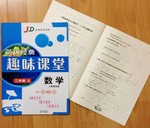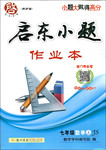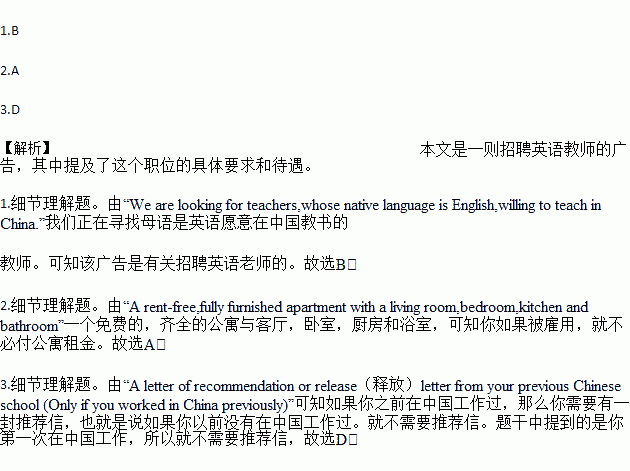题目内容
FOREIGN TEACHERS ARE NEEDED ALL OVER CHINA
Ad No.90347
Posted July 12,2016 14:00 by Amanda
Expire Date August 12,2016
Tag: Beijing Language Teaching Part Time
We are looking for teachers,whose native language is English,willing to teach in China.Most schools are in the south of China.
The benefit package for ESL teachers includes:
One-year contract: 1st September 2016 to 1st August 2017
Salary: ¥4,000 to¥5,000/mouth
Teaching load & schedule: 20 teaching hours per week
A rent-free,fully furnished apartment with a living room,bedroom,kitchen and bathroom
Kitchen facilities provided,other electric appliances will be supplied: water,heater,microwave etc.
If you are interested,please read the information above and kindly send your application to attach the following documents (in doc or JPEG format).The subject to be mentioned,as "teach in China"
l).CV/Resume(简历)
2).A copy of academic degree,diploma,certificate or college transcript
3).A photocopy of the data page of valid passport
4).A recent color photo
5).A letter of recommendation or release(释放)letter from your previous Chinese school (Only if you worked in China previously)
6).Any other relevant information that you think might help your application
1.This advertisement is about .
A. introducing a school B. taking on English teachers
C. seeking a teaching position D. attracting foreign students
2.If you are employed,you will .
A. not have to pay the apartment rent B. work full time
C. prepare furniture yourself D. work four months for two years
3.What is NOT needed to apply for the job if you come to work in China for the first time?
A. Your resume B. Your personal passport data
C. Your academic history D. A release letter
 黄冈经典趣味课堂系列答案
黄冈经典趣味课堂系列答案 启东小题作业本系列答案
启东小题作业本系列答案

 It ________ several days before he could eventually(最后) speak. Beside his bed,I held his hand gently,________ of hurting him. “Daddy… I am sorry…” “ It’s okay, my dear, I’ll be okay.”
It ________ several days before he could eventually(最后) speak. Beside his bed,I held his hand gently,________ of hurting him. “Daddy… I am sorry…” “ It’s okay, my dear, I’ll be okay.”